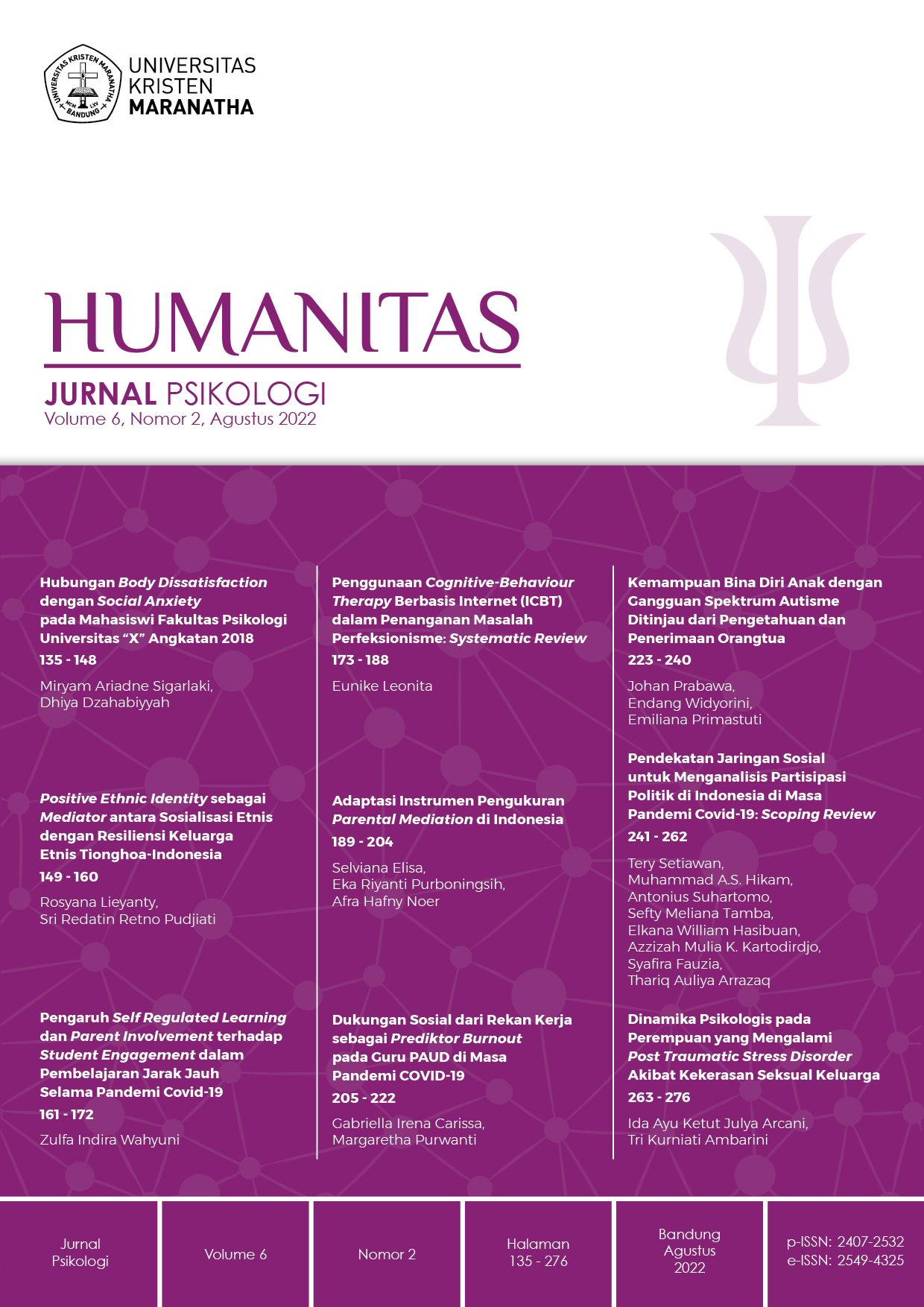Penggunaan Cognitive-Behaviour Therapy Berbasis Internet (ICBT) dalam Penanganan Masalah Perfeksionisme: Systematic Review
Isi Artikel Utama
Abstrak
Unduhan
Rincian Artikel

Artikel ini berlisensi Creative Commons Attribution-NonCommercial 4.0 International License.
Referensi
Andersson, G. (2016). Internet-Delivered Psychological Treatments. Annual Review of Clinical Psychology, 12(1), 157–179.
Andersson, G., Titov, N., Dear, B. F., Rozental, A., & Carlbring, P. (2019). Internet-delivered psychological treatments: from innovation to implementation. World Psychiatry, 18(1), 20–28.
Arpin-Cribbie, C., Irvine, J., & Ritvo, P. (2012). Web-based cognitive-behavioural therapy for perfectionism: A randomized controlled trial. Psychotherapy Research 22(2), 194-207.
Buhrman, M., Gelberg, O., Jovicic, F., Molin, K., Forsstrom, D., Andersson, G., . . . Rozental, A. (2020). Treating Perfectionism Using Internet-Based Cognitive Behavior Therapy: A Study Protocol for a Randomized Controlled Trial Comparing Two Types of Treatment. Internet Interventions 21, 1-8.
Carlbring, P., Andersson, G., Cuijipers, P., Riper, H., & Hedman-Lagerlof, E. (2018). Internet-based vs. face-to-face cognitive behaviour therapy for psychiatric and somatic disorders: an updated systematic review and meta-analysis. Cognitive Behaviour Therapy Vol.47 No.1, 1-18.
Cummings, G., & Estabrooks, C. A. (2003). The Effects of Hospital Restructuring That Included Layoffs on Individual Nurses Who Remained Employed: A Systematic Review of Impact. International Journal of Sociology and Social Policy Vol.23 No.8/9, 8-53.
Effective Public Health Practice Project. (1998). Quality Assessment Tool For Quantitative Studies. Hamilton, ON: Effective Public Health Practice Project. Available from: https://merst.ca/ephpp/
Egan, S. J., van Noort, E., Chee, A., Kane, R. T., Hoiles, K. J., Shafran, R., & Wade, T. D. (2014). A randomised controlled trial of face to face versus pure online self-help cognitive behavioural treatment for perfectionism. Behaviour Research and Therapy 63, 107-113.
Flett, G.L., R.A. Davis, P.L. Hewitt. (2003). Dimensions of perfectionism, unconditional self-acceptance, and depression. Journal Of Rational-Emotive & Cognitive-Behaviour Therapy, 21(2), 119-138.
Flett, G. L., Greene, A., & Hewitt, P. L. (2004). Dimensions of perfectionism and anxiety sesitivity. Journal of Rational-Emotive & Cognitive-Behaviour Therapy 22(1), 39-57.
Flett, G. L., & Hewitt, P. L. (2012). Perfectionism and Cognitive Factors in Distress and Dysfunction in Children and Adolescents: Introduction to the Special Issue. Cognitive-Behaviour Therapy No.30, 53-61.
Frost, R. O., Marten, P., Lahart, C., & Rosenblate, R. (1990). The Dimensions of Perfectionism. Cognitive Therapy and Research Vol.14 No.5, 449-468.
Hamachek, D. E. (1978). Psychodynamics of normal and neurotic perfectionism. Psychology, 15, 27–33.
Johnson, S., Egan, S. J., Andersson, G., Carlbring, P., Shafran, R., & Wade, T. D. (2019). Internet-delivered Cognitive Behavioural Therapy for Perfectionism: Targeting Dysmorphic Concern. Body Image 30, 44-55.
Khan, K., Kunz, R., Kleijnen, J., & Antes, G. (2011). Systematic reviews to support evidence-based medicine: how to review and apply findings of healthcare research. London: Royal Society of Medicine Press.
Kothari, R., Barker, C., Pistrang, N., Rozental, A., Egan, S., Wade, T., . . . Shafran, R. (2019). A randomised controlled trial of guided internet-based cognitive behavioural therapy for perfectionism: Effects on psychopathology and transdiagnostic processes. Journal of Behavior Therapy and Experimental Psychiatry 64, 113-122.
Kothari, R., Egan, S., Wade, T., Andersson, G., & Shafran, R. (2016). Overcoming Perfectionism: Protocol of a Randomized Controlled Trial of an Internet-Based Guided Self-Help Cognitive Behavioral Therapy Intervention. JMR Research Protocols 5(4), 1-9.
Lloyd, S., Schmidt, U., Khondoker, M., & Tchanturia, K. (2014). Can Psychological Interventions Reduce Perfectionism? A Systematic Review and Meta-analysis. Behavioural and Cognitive Psychotherapy, 1-27.
Rozental, A., Shafran, R., Wade, T. D., Kothari, R., Egan, S. J., Ekberg, L., . . . Andersson, G. (2018). Guided Web-Based Cognitive Behavior Therapy for Perfectionism: Results From Two Different Randomized Controlled Trials. Journal of medical internet research 20(4), 1-10.
Rozental, A., Shafran, R., Wade, T., Egan, S., Nordgren, L. B., Carlbring, P., . . . Andersson, G. (2017). A randomized controlled trial of Internet-Based Cognitive Behaviour Therapy for perfectionism including an investigation of outcome predictors. Behaviour Research and Therapy 95, 79-86.
Shafran, R., Cooper, Z., & Fairburn, C. G. (2002). Clinical perfectionism: a cognitive-behavioural analysis. Behaviour Research and Therapy 40, 773-791.
Shafran, R., Wade, T., Egan, S., Kothari, R., Allcott-Watson, H., Carlbring, P., . . . Andersson, G. (2017). Is the devil in the detail? A randomized controlled trial of guided internet-based CBT for perfectionism. Behavior Research and Therapy 95, 99-106.
Shu, C. Y., Watson, H. J., Anderson, R. A., Wade, T. D., Kane, R. T., & Egan, S. J. (2019). A randomized controlled trial of unguided internet cognitive behaviour therapy for perfectionism in adolescents: Impact on risk for eating disorders. Behaviour Research and Therapy 120, 1-9.
Stairs, A.M., Smith, G.T., Zapolski, T.C.B., Combs, J.L., Settles, R.E., 2012. Clarifying the construct of perfectionism. Assessment 19 (2), 146–166.
Titov, N., Dear, B. F., Johnston, L., Lorian, C., Zou, J., Wootton, B., Rapee, R. M. (2013). Improving adherence and clinical outcomes in self-guided internet treatment for anxiety and depression: Randomized controlled trial. PLoS One, 8(7), 1-8.
Wade, T. D., Kay, E., de Valle, M. K., Egan, S. J., Andersson, G., Carlbring, P., & Shafran, R. (2019). Internet-based cognitive behaviour therapy for perfectionism: More is better but no need to be prescriptive. Clinical Psychologist, 1-10.
Zetterberg, M., Carlbring, P., Andersson, G., Berg, M., Shafran, R., & Rozental, A. (2019). Internet-based cognitive behavioural therapy of perfectionism: Comparing regular therapist support and support upon request. Internet Interventions 17, 1-9.

